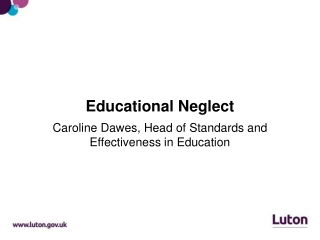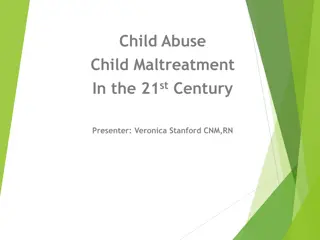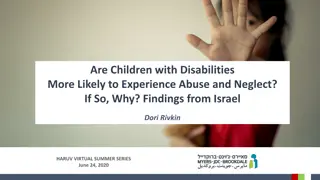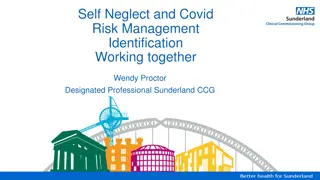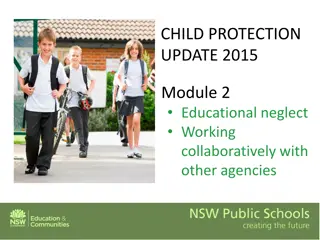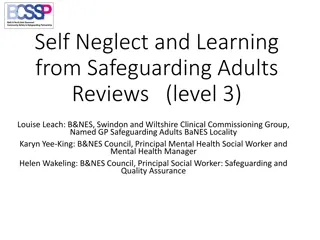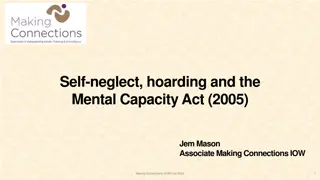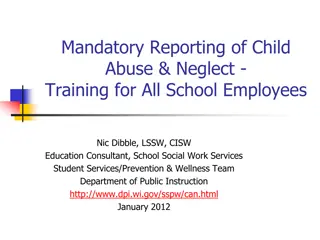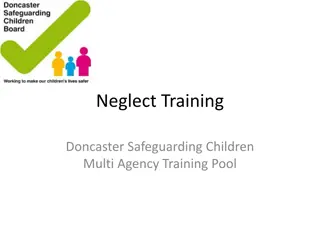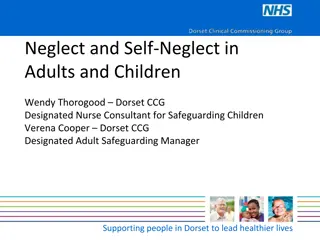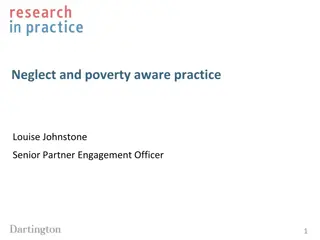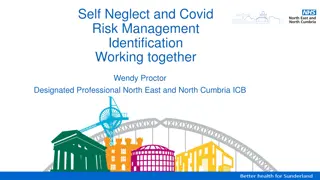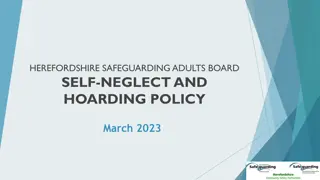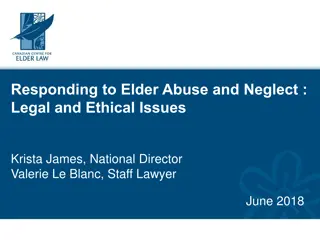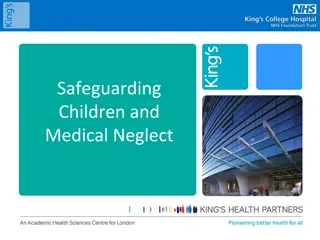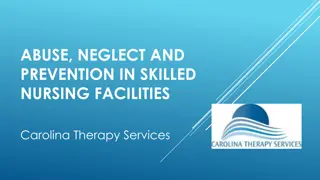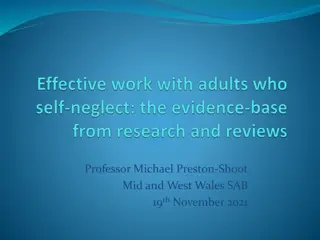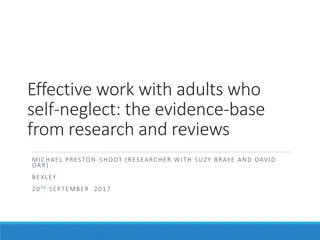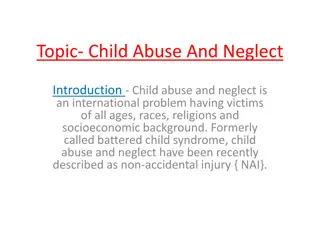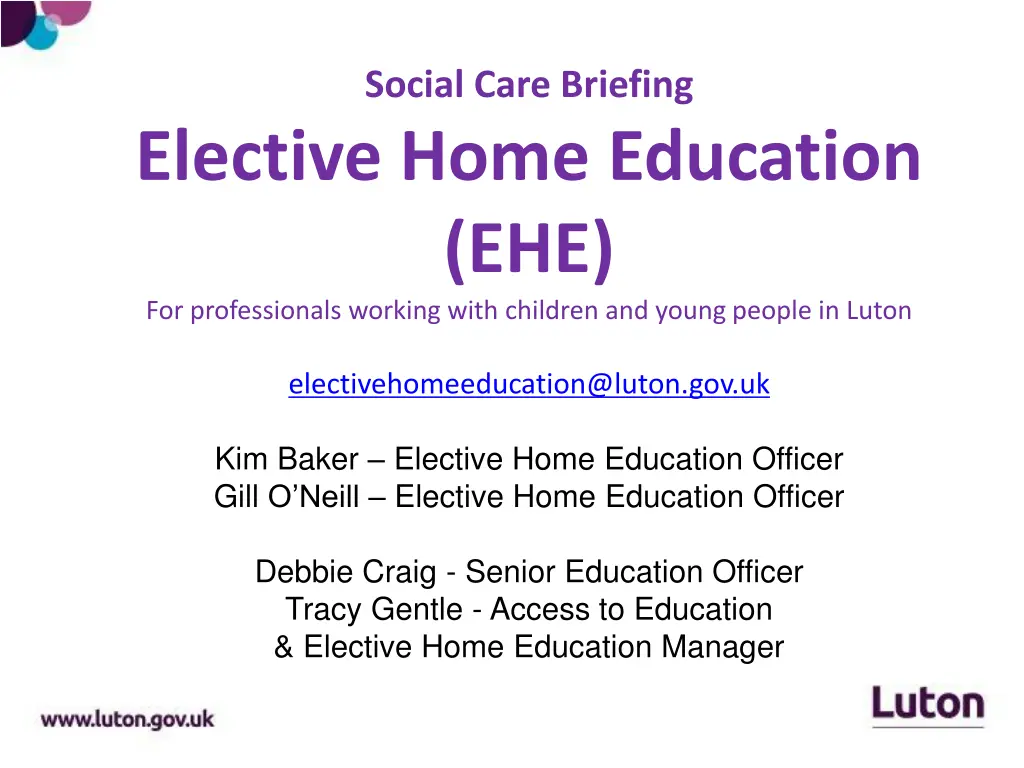
Understanding Elective Home Education in Luton
Explore the concept of Elective Home Education (EHE) in Luton, including the responsibilities of the Local Authority (LA), limitations faced, and the importance of supporting parents who choose to educate their children at home. Gain insights from government guidance and commission findings on children's attendance in education.
Uploaded on | 2 Views
Download Presentation

Please find below an Image/Link to download the presentation.
The content on the website is provided AS IS for your information and personal use only. It may not be sold, licensed, or shared on other websites without obtaining consent from the author. If you encounter any issues during the download, it is possible that the publisher has removed the file from their server.
You are allowed to download the files provided on this website for personal or commercial use, subject to the condition that they are used lawfully. All files are the property of their respective owners.
The content on the website is provided AS IS for your information and personal use only. It may not be sold, licensed, or shared on other websites without obtaining consent from the author.
E N D
Presentation Transcript
Social Care Briefing Elective Home Education (EHE) For professionals working with children and young people in Luton electivehomeeducation@luton.gov.uk Kim Baker Elective Home Education Officer Gill O Neill Elective Home Education Officer Debbie Craig - Senior Education Officer Tracy Gentle - Access to Education & Elective Home Education Manager
Aims of the briefing To develop an awareness of Elective Home Education (EHE) in Luton To provide an overview of Local Authority (LA) duties with regard to EHE To demonstrate the limitations of the LA regarding EHE
Elective Home Education Definition Elective home education (EHE) is the term used by the Department for Education (DfE) to describe parents /carers decisions to provide education for their children at home instead of sending them to school. This is different to learning at home during school closures, home tuition provided by a Local Authority (LA) or education provided by a Local Authority other than at a school e.g. medical tuition provided via Alternative Learning & Progression Service (ALPS)
Educating at Home Parents have a right to educate their children at home, and the government wants the many parents who do it well to be supported. They devote time, financial resources and dedication to the education of their children. Most parents who take up the weighty responsibility of home education do a great job, and many children benefit from being educated at home. Educating children at home works well when it is a positive, informed and dedicated choice. DFE Elective Home Education - Departmental guidance for local authorities, April 2019
Where are Englands Children? Interim findings from the Children s Commissioner s Attendance Audit While the majority of children are attending [school] every day, there are tens of thousands of children who are persistently or severely absent or missing from education altogether. Even before the pandemic there were a group of children who were falling through the gaps in education those awaiting a school place, those being educated at home because their needs weren t being met at school, and those who had simply fallen off the radar. there are hundreds of children that have never interacted with the education system that we know nothing about. The known unknowns , includes children who have never been on a school roll, perhaps because they have gone missing from care or who have been trafficked into the country. Rachel DeSouza DBE Children s Commisioner for England March 2022
Luton Perspective Historically there have been between 80 and 500 children on the EHE register at any one time in Luton. As of 24/04/2023 there were 462 cases (314 open, 148 closed this year) and 9 non-statutory school aged children. Stated reasons for opting to Home Educate for children currently on the EHE register Attendance Issues 3 Short-term Intervention COVID-19 Concerns 1 Attendance prosecution Bullying 1 31 16 Traveller Values 14 5 Desire for closer relationship Dissatisfaction with system Philosophical Welfare Issues 6 53 Distance to School/Access Awaiting Preferred School Place Other 3 100 13 Religious/Cultural 3 37 Special Needs 11 Not Stated 17
EHE Quiz Which response do you think is most appropriate? Record your answer in the chat function. If you re not sure take an educated guess.
1. Are parents/carers required to inform the Local Authority (LA) when electing to home educate? A. The parent/carer must inform the LA if they plan to provide EHE for their child. B. The parent/carer must inform the LA if they remove their child from a school in order to provide EHE. C. There is no requirement for a parent/carer to inform the LA if they plan to provide EHE.
2. When are parents/carers prevented from home educating? A. The child is subject to a Child Protection Plan B. The child has an Education, Health and Care Plan C. Any child can be home educated.
Home Educated Students Social Care Status Social Care Status Not known to social care 154 Previously known to social care 153 Open to social care 7
Children Open to Social Care Does not preclude a parent from electing to home educate. EHE officers visits are only to monitor the education package provided. Joint visits with allocated social worker enable a more joined up approach. Parents can decline a home visit by EHE officer, request meetings outside the home, or may opt to submit a written report instead (even if open to social care). Information sharing is vital including multi-disciplinary meetings Social care to be aware of the limitations of EHE and the possible increased vulnerability to these students
Special Educational Needs & Disability (SEND) & Elective Home Education Parent can choose to provide EHE for a child with SEND and a child with an Education Health and Care Plan (EHCP) If the child has an EHCP it remains LA duty to ensure the child s needs are met An additional review to agree that proposed provision is suitable following parental request to home educate EHE can be agreed by SENAT as long as the child s needs will be met Annual reviews to ensure needs met - joint home visit from EHE Officer & Special Educational Needs Assessment Team (SENAT) If the parent/carer of a child currently on a special school roll with an EHCP wishes to home educate LA consent is required.
3. What constitutes a suitable education? A. There is no explicit definition. B. Children must follow the National Curriculum. C. Children must learn English, Maths and Science as a minimum and then a broad and balanced curriculum of the parent s/carer s or child s choosing.
A suitable education The responsibility for a child s education rests with his or her parent/carer. An efficient and suitable education is not defined in the Education Act 1996 but efficient has been broadly described in case law as an education that achieves that which it sets out to achieve , and a suitable education is one that primarily equips a child for life within the community of which he is a member, rather than the way of life in the country as a whole, as long as it does not foreclose the child s options in later years to adopt some other way of life if he wishes to do so .
4. What are the requirements for health and safety in the home? A. There are checks to ensure that the learning environment is safe, properly equipped for the child s learning. B. The learning environment must be safe with a basic level of equipment; electronics, computers, devices etc. should be PAT tested. C. There are no requirements for the learning environment and health and safety checks are not carried out.
5. Must private tutors be checked by the Disclosure and Barring Service (DBS)? A. An enhanced check is required of private tutors. B. There is no requirement for any checks for private tutors. C. Private tutors are required to complete a standard DBS check.
6. To what level must parents/carers be qualified? A. No qualifications or literacy requirements B. The parent/carer must be educated to at least the standard or qualification for which they are preparing their child. C. The parent/carer must have a degree or equivalent qualification.
7. What are the expectations for social learning? A. The parent/carer is not obliged to provide for social learning B. The child should be provided with opportunities to mix with other children of similar age, including those from other cultures. C. The child should be given opportunities to socialise with other children.
8. How often must the childs education be monitored? A. The child s education must be judged suitable at least once a term B. The child s education should be monitored at least annually. C. There is no legal requirement for the child s education to be monitored on a routine basis.
9. You may not home educate if: A. The parent/carer has a criminal record which makes them unsuitable for working with children. B. The parent/carer has current significant mental health problems C. Any parent can home educate.
How well did you score? Which answer surprised you the most? Which of the answers might make you feel concerned? Any questions?
Thank you kim.baker@luton.gov.uk gill.oneill@luton.gov.uk electivehomeeductaion@luton.gov.uk

